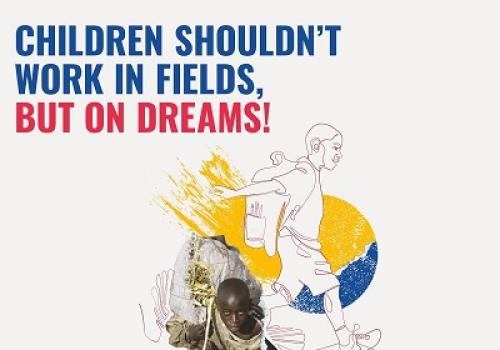The Southern African Development Community joins the world in commemorating the World Day Against Child Labour, on 12th June 2019, under the theme; “children shouldn’t work in fields but on dreams”. The SADC Decent Work Agenda (2013-2019) places eradication of child labour at the centre of its efforts to enhance living standards and the quality of life of SADC citizens in particular the youth.
Member States have domesticated this Agenda through decent work country programmes as well as responsive legal and policy measures covering all children, informed by global labour standards. These steps represent the region’s firm commitment to contribute to the realisation of Sustainable Development Goal no. 8, and specifically target 8.7, on the eradication of child labour in all its forms by 2025, together with related ills, including modern slavery and human trafficking, as well as, recruitment and use of child soldiers.
Despite the strides made so far, child labour continues to be of serious concern due to the persistence of poverty, inequality and other developmental challenges faced by the region. High decent work deficits in the region, characterised by high informal employment and a large proportion of the working poor of around 50%, means that many children are susceptible to child labour as a way of supplementing household incomes. This is mostly the case in the agricultural sector, which is the region’s leading source of employment but one that also poses serious health and safety issues for children due to arduous labour, and exposure to dangerous chemicals and machinery.
SADC affirms its commitment to ensure that quality education and skills development become the means by which, children realise their dreams and entitlements for a better and productive adulthood. Given the rapid pace of socio-economic transformations affecting the world today, it is imperative that SADC Member States invest in high quality education, so that children can acquire the critical skills that are appropriate and relevant for adaptation in the ever evolving economic systems and labour market conditions. Measures to address children’s learning deficits by increasing the early enrolment of boys and girls in Science, Technology, Engineering and Mathematics (STEM) and ICT related fields and by ensuring higher transition rates from primary to secondary education should continue to be prioritised. As a matter of principle, sufficient investments should be made to progressively ensure that all children below the general minimum age are afforded effective enjoyment of the right to education.
SADC recognises that greater progress in the fight against child labour can only be realised in combination with inclusive economic growth, in a context where labour markets can provide sufficient jobs and income security for those of working age. As the region transitions to its next generation of the SADC Decent Work Programme, greater focus will be on priorities of sustainable economic growth and employment creation in the context of the SADC Industrialisation Strategy and Roadmap (2015-2063). Emphasis will also be placed on the full implementation of the SADC Protocol on Education and Training of 1997 and the SADC Policy Framework on Care and Support for Teaching and Learning to keep children and young people in school.
With over 150 million children still estimated to be in child labour across the world today, and with Africa accounting for the largest share, SADC calls for sustained partnerships involving, among others, governments, employers’ and workers’ organisations in order to accelerate action to end child labour, if the 2025 eradication target is to be attained. As a region, we commit to make our fullest contribution towards this urgent and most noble target so that children in SADC and beyond can have the full opportunity to work on their dreams and, more importantly, to realise them.

